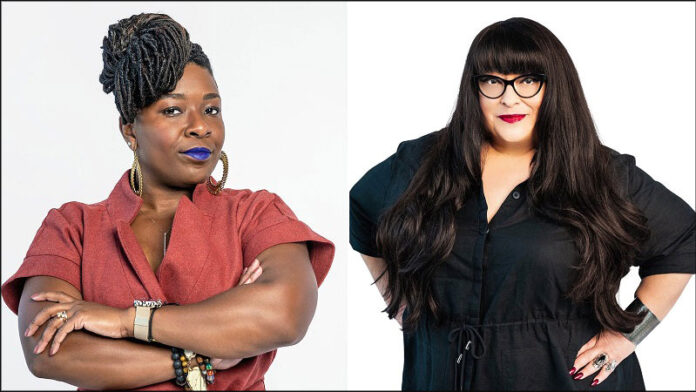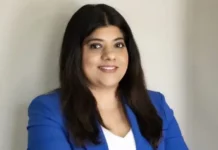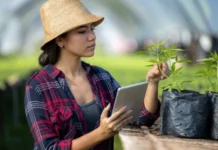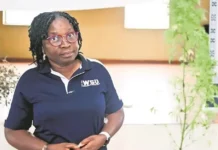Meet the two women promoting racial equity within the cannabis industry
The People’s Group Fund is promoting racial equity by supporting women’s economic empowerment in communities of color
Even though Christine De La Rosa lived in California, the first US state to legalize medical cannabis, it never occurred to her to use the substance to treat her illnesses. She couldn’t shake the cultural stigma she had internalized around Mexican people like her who used cannabis.
States started passing discriminatory laws to ban cannabis after the Mexican Revolution in 1910, when Mexican immigrants entering the country became associated with the plant.
“When I left for college, my mother said, ‘You know, don’t smoke marijuana or they’re going to think you’re a lazy Mexican,’” De La Rosa told Global Citizen.
Then a near-death experience and a diagnosis for lupus — an autoimmune disease that disproportionately impacts women of color and often goes undetected due to socioeconomic barriers — led her to research alternative medicines. De La Rosa found that cannabis offered more relief than the other 11 drugs doctors prescribed, including five opiates, steroid infusions, and a fentanyl patch.
After feeling like she lost five years of her life to lupus, which left her bedridden, rather than return to her job and comfy salary as a database architect, De La Rosa ventured into the budding cannabis industry.
Trying to open The People’s Dispensary in Oakland, California, in 2015, it didn’t take long for her to see that women of color in cannabis were not receiving the capital they needed to succeed. She wanted to help address the problem.
De La Rosa is now co-partner at The People’s Group Fund, a company for promoting racial equity that recently launched a $50 million equity fund for 10 to 20 women and BIPOC-led cannabis businesses with plans to deploy the funds by 2024.
“They need late-stage capital, but cannot find it because they don’t fit the mold of what people are used to investing in, which is other white people,” she said. “They [find it] very easy to write checks to other white men. Not because they’re smarter, not because they’re better.”
Only around 2% of private equity funds in the US go to BIPOC people, De La Rosa explained.
A 2017 survey also found that less than a fifth of the people involved at the ownership or stakeholder level in the cannabis industry were people of color and Black people only made up 4.3%. The percentage of women and BIPOC executives have fallen for the past two years with only 22.1% of cannabis executives being women, compared to 36.8% in 2019 and the number of people of color represented at the executive level dropped from 28% (2019) to 13.1% (2021).
Often people of color aren’t invited into the spaces where investment opportunities present themselves, Frederika McClary Easley, director of strategic initiatives at the People’s Group Fund, told Global Citizen.
“Nine times out of 10, people of color don’t have access to those deals that are made on the golf course,” Easley said.
Easley joined the People’s Group after spending much of her working life advocating for labor rights and witnessing the impact of cannabis prohibition on the Black community.
US President Richard Nixon’s “war on drugs” that started in 1971 directly targeted people of color, De La Rosa explained.
“You were told as you were growing up [to] just say no to drugs,” she said. “What we didn’t know at the time is it wasn’t a drug war. It was a Black war. It was a Latin War. It was a war against people who were not white.”
The aftermath of Nixon’s racist campaign can still be felt 50 years later. A 2013 report by the ACLU found that African Americans were 3.73 times more likely than white people to be arrested for cannabis use even though both groups used the substance at the same rates. And when people of color are arrested for low-level crimes like cannabis possession, the fines and fees, and the cash bail system add to the list of disadvantages that trap them in poverty.
“I have family right now who are locked up right now for something that, to be frank, rich white men are making more money off, and they are still paying with their life,” Easley said. “As a family and as a village, as a community, we’re still experiencing that trauma.”
During the COVID-19 pandemic, cannabis dispensaries were deemed essential businesses allowed to stay open, she pointed out. The crisis highlighted the substance’s role in helping people deal with their anxiety, a coping mechanism that Easley said she’s seen prominently in the Black community but is still considered taboo due to the incarceration risks associated with use.
“As a Black woman and from a community primarily of Black people, this is what we deal with every day,” she said. “We deal with stress at the level of a pandemic every day through macro [and] microaggressions, and I grew up with people who were using cannabis to medicate, to think, to deal with the daily stressors. But it was fear, after watching generations and generations of Black and Indigenous men and women, husbands, wives, sisters, brothers being locked up for it, that really created those barriers. There are still Black people picking cotton for nonviolent offenses dealing with cannabis.”
Cannabis is now recreationally legal in 18 states, medically legal in 37 states, and decriminalized in 13 states. In 2020, however, 40,000 Americans were still incarcerated for cannabis offenses. De La Rosa sees a direct link between the lag in cannabis legalization nationwide and the threat it poses to the pharmaceutical industry.
“I think that they are regulating it so hard because they’re afraid that people of color, Black people, Indigenous people will definitely not need their prescriptions if they figure out how to treat themselves,” she said.
Promoting Racial Equity
De La Rosa hopes funding BIPOC and women-owned cannabis businesses will promote diversity, support criminal justice reform, and move cannabis legislation forward.
“We’re talking about businesses that are going to be in communities of color, which means that we are bringing dollars to that community,” she said. “People are paying taxes that are going to help that community. People are providing jobs that are going to help stabilize and mobilize that community. People are reinvesting. We know at [a] much greater rate, BIPOC women-owned businesses reinvest in communities.”
When launching The People’s Fund, it was important to De La Rosa to pay it forward.
“I’m not going to be a billionaire in cannabis,” she said. “Why would that be the aspiration when I could have 100 people, 200 people being able to feed their families, have a good life, put some money away, create generational wealth for their families?”
De La Rosa would like to see other everyday citizens support the social and equitable inclusion of cannabis entrepreneurs, too. She recommended that shoppers in states where cannabis is legal seek out products made by women and people of color if they are visiting dispensaries.
“Some states don’t have a single BIPOC women-led brand on their shelf,” De La Rosa said. “You need to ask them why. You need to tell them that they need to start carrying those because these are the products that you’re interested in.”
And voting in the polls is just as crucial as voting with dollars, Easley added. She urges people to ask their local elected officials what they are doing to help inmates who are still incarcerated for cannabis even in legal states.
“I know that our political system can be discouraging,” she said. “I know that we can often feel like our vote does not make a difference on a local level. They can make a decision today and you feel it tomorrow. We have to engage there.”











